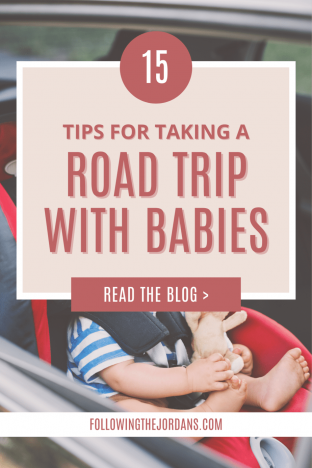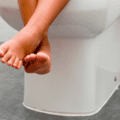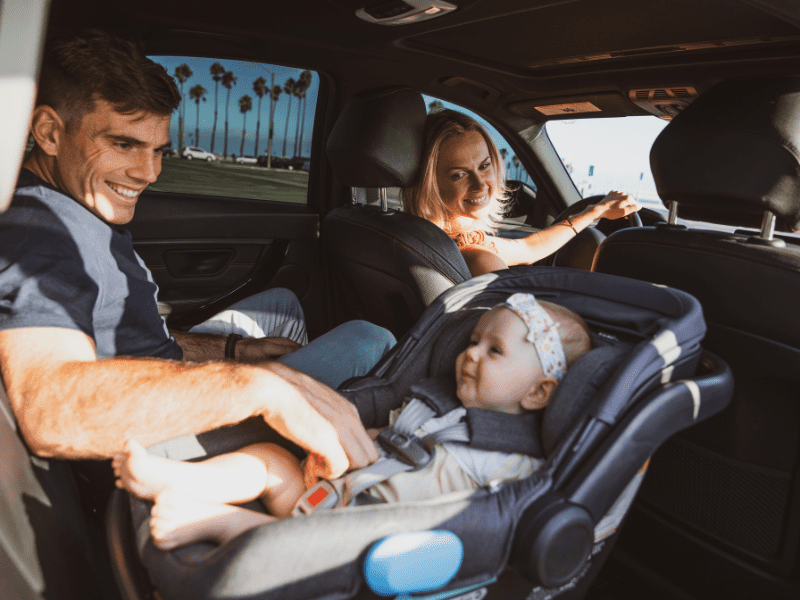
15 Tips for Taking a Road Trip with Babies
Whether you’re heading to the beach or grandma’s house that is eight hours away, taking a road trip with babies is never as easy as you’d hope. Road tripping with babies takes planning ahead of time and being ready to adapt when things go wrong.
Something always goes wrong.
Plan a road trip seems hard, especially when traveling with a baby. You need to have all the supplies needed your baby may require, along with dealing with diaper changing, feeding schedule, and crying.
Lots of crying.
However, you can ease your anxiety to make your road trip with babies easier. Here are some of my best tips.
15 Tips for Taking a Road Trip with Babies

1. Be Flexible
You absolutely have to be flexible when traveling with a baby. You always have options; If your baby is too fussy, it’s ok to stop and stay over somewhere. If you have to stop for a few hours, that’s okay too.
While plans are important – I discuss those later – it’s ok to be flexible and stop when your baby needs the most. The last thing you need to is to try to stick to a self-imposed schedule just because; what’s most important is keeping everyone in your car as happy as possible.
2. Keep Your Expectations Low
One of the most important things you can do is not set your expectations too high. Babies typically lack the patience you have, and they have needs adults don’t have. So, driving straight to the destination without any stops is rarely possible.
Expecting your child to not cry or be happy the entire road trip isn’t setting good expectations. Your child will cry, need a break from their car seat, and be fed regularly.
I honestly expect the worse from my kids whenever we head on a road trip. That way, if it turns out to be a cry fest for several hours, then I won’t feel disappointed.
3. Plan Wisely
Planning your trip helps tremendously. Not only do you have to plan how far to drive in each day, but you need to map out your journey and plan your supplies.
Plan your stops along your routine and research what will be along your way. You might find some restaurants to stop at, and you want to pick a hotel to stay at if you divide the trip into two days. Depending on your child’s age, you may also want to stop at a playground to give some time to stretch and work their legs.
4. Tag Team with Your Partner
Having an adult to help you while you drive or vice versa is ideal when taking a road trip with babies. A caretaker helps with all the problems that your infant has whether preparing bottles or reading books.
Or playing endless games of peek-a-boo.
5. Keep All The Supplies at Hand
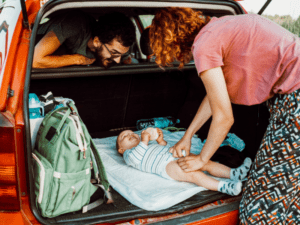
Organizing your supplies like a pro makes your road trip with babies much easier. It’s important to think about what you will need at arm’s reach compared to what you can stow away for the end of your trip.
Large items should be stored in your trunk, like your suitcases and large baby items. These things won’t be needed until you reach your destination. Then, you need a separate bag with pacifiers, toys, burp cloths, and extra blankets.
I also suggest you create a separate changing station with a portable changing pad – sometimes, those changing stations in rest stops are sketchy. In this changing station, keep wipes, diapers, diaper cream, small diaper trash bags, and at least one extra set of clothing.
Babies often have a lot of extra items, so instead of bringing a large diaper bag, consider a portable diaper caddy organizer. A caddy allows you to pre-stock the caddy at home.
Some things you should have on hand include:
6. Bring Extra Supplies as Well
You should have extra supplies on hand as well. Whether you are breastfeeding or using formula, you’ll need extra feeding supplies when on the road with your infant.
Something you should consider is if you can’t pull over a nurse, you need to have a breast pump with you. At times, traffic gets so bad that you may not be able to reach a rest stop. I prefer to keep a manual breast pump and a bottle or two with you.
If you’re formula feeding, make sure you have more formula on hand than you expect to need. If your trip takes longer than you expect, you want to have plenty on hand.
Don’t forget that baby wipes are like gold when traveling. It feels like you can use baby wipes for everything whether cleaning spilling, wiping dirty hands, and cleaning surfaces.
7. Have Snacks on Deck
If your baby eats solid foods, you’ll need to make sure you bring a cooler full of snacks. It helps you avoid pit-stops or eating poor fast foods. A cooler with a few ice packs will store perishable foods for several hours.
Don’t forget to pack snacks you enjoy as well!
Here are some ideas for road trip snacks.
- PB&J Sandwiches
- Carrots & Dip
- Fresh Fruit
- Nuts
- Yogurt Tubes
- Applesauce
- Cheese & Crackers
8. Plan Bottle or Nursing Breaks Well
Your baby needs to eat during your road trip, whether you nurse, pump, or formula feed, so make sure you have all of your supplies at hand. Think about how often you need to feed your baby and the supplies you need.
If you nurse your baby, consider bringing a pillow for feeding your baby in the car; sometimes, you just need to give your baby a bit of comfort while pumping gas.
If you bottle feed your baby, bring a thermos with hot water or a portable bottle warmer, allowing you to warm your baby’s bottle wherever you are.
9. Drive at Night if Possible
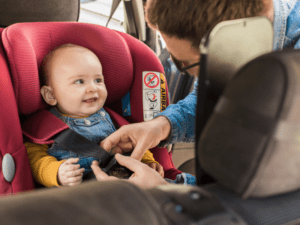
Timing your road trip with babies is essential; if your baby sleeps well in the car, plan your trips to match your baby’s sleep time. Ideally, driving at night and nap times are ideal. This means a chunk of your driving time will be peaceful and quiet, giving everyone a bit of time to recharge.
However, if your baby hates sleeping in the car, the best time to drive is to leave after they wake up or right after a nap. At least you start your journey with a happy baby rather than a grumpy one.
A word of caution: traveling at night is tricky for some people. If you don’t think you or your partner can safely drive at night and stay awake, then avoid this, even if it’s harder to travel during the day.
10. Use a White Noise Machine & Portable Shades
Getting your baby to sleep for as much of the trip as possible is essential; it keeps everyone happy. Recreate your baby’s sleeping environment to the best of your ability.
Make sure you bring any comfort items, such as blankets and a portable white noise machine. You’ll also want to include portable window shades to protect your child from the UV rays.
11. Don’t Go for the Scenic Route
When you prepare the route to your trip, avoid the scenic overlooks and long stretches of open road. You may want to see things along the route, but the reality is you need the quickest route.
Look for a routine in advance that has 24 hour gas stations, restaurant, and services areas along the route.
12. Take as Many Breaks as Possible
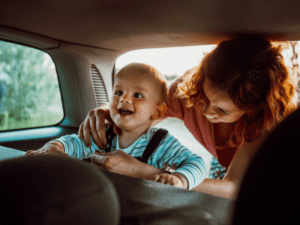
The GPS might tell you that the trip is six hours, but that time is without any breaks. Realistically, you’ll need to stop every hour and a half to two hours. You may be able to last longer, but babies need to stretch out of the car seat. Plus, most babies need to eat every two hours, and their diapers are undoubtedly ready for a change.
While breaks make the trips longer, but it also helps your baby stay happier. A longer happier trip is much better than a shorter, cry-filled trip.
13. Have Some Baby Entertainment
Depending on your baby’s age, chances are you need some sort of entertainment. When your baby is awake, make sure you have several age-appropriate toys for them to enjoy. New toys are often ideal during a road trip with babies because they hold their attention.
You can try some DIY baby toys as well. For example, put string across your baby’s car seat and attach photos of your baby or family members. Babies love to look at people’s faces.
Babies love to have a toy strip in front of their car seat that dangles different toys in front of your baby’s face. Make sure you have a car seat mirror as well; this lets you keep tabs on your baby while driving. Plus, babies love to look at themselves.
14. Save Space for an Adult in the Back Seat
As long as you aren’t traveling solo, try to save space in your back seat for another adult to sit with your baby. When your baby starts crying, you may need an adult back there to help your child. Babies drop toys, need bottles, and start to cry out of boredom.
15. Make Sure You’re Prepared for Anything
You can always hope your road trip with your family is smooth, but the reality is you should always be prepared for the worse. We’ve expected it all from flat tires to car sicknesses.
Get a bucket or a garbage pail, and make sure everyone has a towel within arm’s reach. Babies, toddlers, and people of all ages get car sick or come down with a sudden stomach bug. That happened to us on our last road trip!
Make sure you have a first aid kit with band aids, bug spray, over-the-counter drugs, and other essentials.
You should also have jumper cables, flares, a spare tire, and jack. Depending on where you’re traveling, a small snow shovel and snow brush will help your road trip.
Pin this blog for later! ↓
